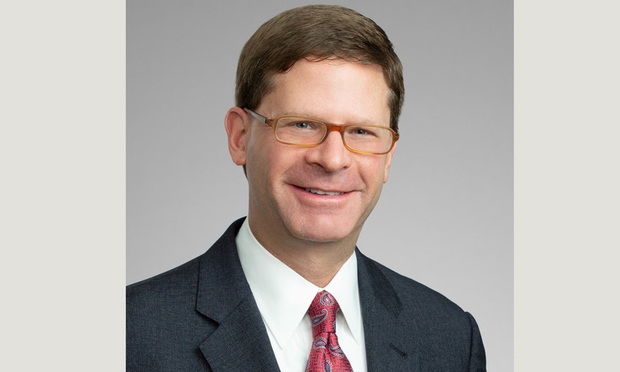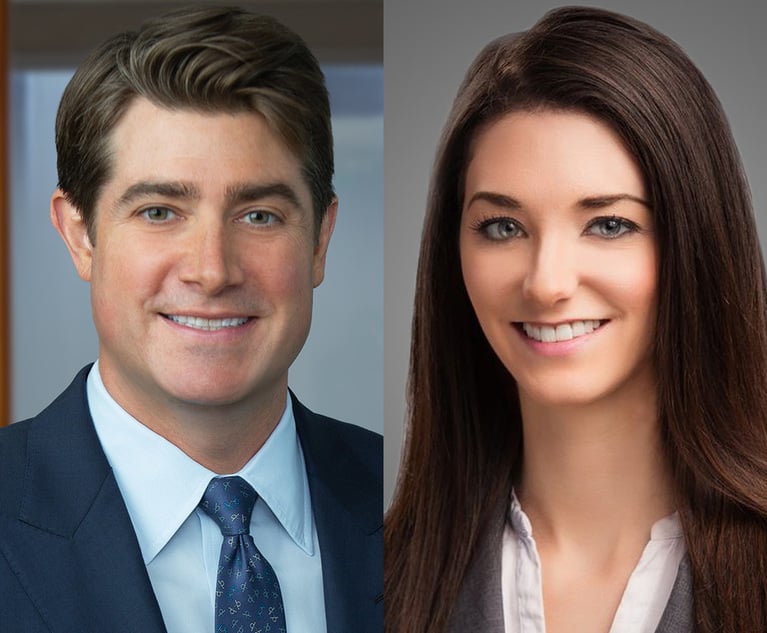Investment Funds Partner Jumps From Gibson Dunn to Latham
Edward Nelson spent more than a decade at Gibson Dunn in New York.
November 18, 2019 at 06:15 PM
3 minute read
 Edward Nelson of Latham & Watkins/courtesy photo
Edward Nelson of Latham & Watkins/courtesy photo
Latham & Watkins on Monday announced it was bolstering its investment funds ranks in New York with a Gibson, Dunn & Crutcher partner who specializes in private investment funds.
Edward Nelson joined Latham as a partner in its corporate department as well as a member of the firm's investment funds practice. Nelson held similar roles at Gibson Dunn, where he had been for more than 10 years.
Nelson's clients have included buyout funds, infrastructure funds, venture capital funds and real estate funds. He also advises clients on issues relating to federal law. Nelson said Latham has a "considerably broader" corporate practice than Gibson Dunn, saying "it's a bigger platform. It's a larger part of the firm's focus" with a lot more lawyers.
"Ed's a terrific addition to our group. We are very focused on strategic growth of our investment funds practice in the U.S. and globally, and Ed joining us now completely enforces that," said Andrea Schwartzman, the global chairwoman of Latham's investment funds practice.
Nelson is the second partner to join Schwartzman's group this year; the first was Ivana Rouse, who left Akin Gump Strauss Hauer & Feld in Houston to join Latham.
Nelson's departure follows others from Gibson Dunn this fall. Last month, Matthew Hurlock, an M&A partner whose clients included private equity firms such as Bain Capital Partners, joined White & Case's New York office. Earlier this month, a trio of Gibson Dunn partners jumped over to Kirkland & Ellis.
But Gibson Dunn has done some poaching of its own. Since Oct. 1, it has added eight partners to its offices in London, New York, Paris and Washington, D.C. Among its newest partners is Kristen Limarzi, the former appellate section chief of the U.S. Department of Justice's Antitrust Division.
Before joining Gibson Dunn, Nelson was a partner at the now-shuttered law firm Dewey & LeBoeuf. Nelson in August 2015 testified in the criminal trial of ex-Dewey chief financial officer Joel Sanders about how he took out a loan from Barclays in order to fund his capital contribution, relying on the firm's assurances that it would pay the bank back.
Sanders was accused of inflating the value of Dewey until the firm went bankrupt and collapsed in 2012. Because of the firm's bankruptcy, Nelson had to pay back the remaining $100,000 he owed on the loan. Sanders was convicted of conspiracy, scheme to defraud and securities fraud in 2017; he's appealing his conviction.
Read More
This content has been archived. It is available through our partners, LexisNexis® and Bloomberg Law.
To view this content, please continue to their sites.
Not a Lexis Subscriber?
Subscribe Now
Not a Bloomberg Law Subscriber?
Subscribe Now
NOT FOR REPRINT
© 2025 ALM Global, LLC, All Rights Reserved. Request academic re-use from www.copyright.com. All other uses, submit a request to [email protected]. For more information visit Asset & Logo Licensing.
You Might Like
View All
White & Case Crosses $4M in PEP, $3B in Revenue in 'Breakthrough Year'
6 minute read
Haynes and Boone Expands in New York With 7-Lawyer Seward & Kissel Fund Finance, Securitization Team
3 minute read
'None of Us Like It': How Expedited Summer Associate Recruiting Affects Law Students and the Firms Hiring Them

Sheppard Mullin, Morgan Lewis and Baker Botts Add Partners in Houston
5 minute readLaw Firms Mentioned
Trending Stories
- 1With AI Expected to Be a Focus This Year, What Changes Can Midsize Firms Expect?
- 2Dissenter Blasts 4th Circuit Majority Decision Upholding Meta's Section 230 Defense
- 3NBA Players Association Finds Its New GC in Warriors Front Office
- 4DC Circuit Keeps Docs in Judge Newman's Misconduct Proceedings Sealed
- 5Litigators of the Week: US Soccer and MLS Fend Off Claims They Conspired to Scuttle Rival League’s Prospect
Who Got The Work
J. Brugh Lower of Gibbons has entered an appearance for industrial equipment supplier Devco Corporation in a pending trademark infringement lawsuit. The suit, accusing the defendant of selling knock-off Graco products, was filed Dec. 18 in New Jersey District Court by Rivkin Radler on behalf of Graco Inc. and Graco Minnesota. The case, assigned to U.S. District Judge Zahid N. Quraishi, is 3:24-cv-11294, Graco Inc. et al v. Devco Corporation.
Who Got The Work
Rebecca Maller-Stein and Kent A. Yalowitz of Arnold & Porter Kaye Scholer have entered their appearances for Hanaco Venture Capital and its executives, Lior Prosor and David Frankel, in a pending securities lawsuit. The action, filed on Dec. 24 in New York Southern District Court by Zell, Aron & Co. on behalf of Goldeneye Advisors, accuses the defendants of negligently and fraudulently managing the plaintiff's $1 million investment. The case, assigned to U.S. District Judge Vernon S. Broderick, is 1:24-cv-09918, Goldeneye Advisors, LLC v. Hanaco Venture Capital, Ltd. et al.
Who Got The Work
Attorneys from A&O Shearman has stepped in as defense counsel for Toronto-Dominion Bank and other defendants in a pending securities class action. The suit, filed Dec. 11 in New York Southern District Court by Bleichmar Fonti & Auld, accuses the defendants of concealing the bank's 'pervasive' deficiencies in regards to its compliance with the Bank Secrecy Act and the quality of its anti-money laundering controls. The case, assigned to U.S. District Judge Arun Subramanian, is 1:24-cv-09445, Gonzalez v. The Toronto-Dominion Bank et al.
Who Got The Work
Crown Castle International, a Pennsylvania company providing shared communications infrastructure, has turned to Luke D. Wolf of Gordon Rees Scully Mansukhani to fend off a pending breach-of-contract lawsuit. The court action, filed Nov. 25 in Michigan Eastern District Court by Hooper Hathaway PC on behalf of The Town Residences LLC, accuses Crown Castle of failing to transfer approximately $30,000 in utility payments from T-Mobile in breach of a roof-top lease and assignment agreement. The case, assigned to U.S. District Judge Susan K. Declercq, is 2:24-cv-13131, The Town Residences LLC v. T-Mobile US, Inc. et al.
Who Got The Work
Wilfred P. Coronato and Daniel M. Schwartz of McCarter & English have stepped in as defense counsel to Electrolux Home Products Inc. in a pending product liability lawsuit. The court action, filed Nov. 26 in New York Eastern District Court by Poulos Lopiccolo PC and Nagel Rice LLP on behalf of David Stern, alleges that the defendant's refrigerators’ drawers and shelving repeatedly break and fall apart within months after purchase. The case, assigned to U.S. District Judge Joan M. Azrack, is 2:24-cv-08204, Stern v. Electrolux Home Products, Inc.
Featured Firms
Law Offices of Gary Martin Hays & Associates, P.C.
(470) 294-1674
Law Offices of Mark E. Salomone
(857) 444-6468
Smith & Hassler
(713) 739-1250










